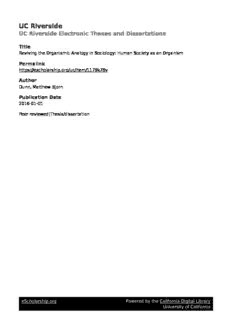Table Of ContentUC Riverside
UC Riverside Electronic Theses and Dissertations
Title
Reviving the Organismic Analogy in Sociology: Human Society as an Organism
Permalink
https://escholarship.org/uc/item/1179k78v
Author
Dunn, Matthew Bjorn
Publication Date
2016
Peer reviewed|Thesis/dissertation
eScholarship.org Powered by the California Digital Library
University of California
UNIVERSITY OF CALIFORNIA
RIVERSIDE
Reviving the Organismic Analogy in Sociology: Human Society as an Organism
A Dissertation submitted in partial satisfaction
of the requirements for the degree of
Doctor of Philosophy
in
Sociology
by
Matthew Bjorn Dunn
June 2016
Dissertation Committee:
Dr. Jonathan H. Turner, Chairperson
Dr. Christopher Chase-Dunn
Dr. Dr. Alexandra Maryanski
Dr. Raymond L. Russell
Copyright by
Matthew Bjorn Dunn
2016
The Dissertation of Matthew Bjorn Dunn is approved:
Committee Chairperson
University of California, Riverside
AKNOWLEDGEMENTS
This dissertation would not have been possible without the help and assistance of many
people. First, I would like to thank all of my family for their love and support over the
years. I would specifically like to thank my parents, Doug and Linda Dunn, and my wife,
Gaby Dunn, for everything. I wouldn’t be where I am today without your unconditional
love and guidance and for that I will forever be grateful. I would also like to thank all of
the faculty at UCR who have both shaped my understanding of the world, and helped me
navigate through the complexities of graduate school. Specifically, I would like to thank
Dr. Jonathan H. Turner, Dr. Alexandra Maryanski, Dr. Christopher Chase-Dunn, Dr.
Raymond Russell, Dr. Stephan K. Sanderson, Dr. Jan E. Stets, Dr. Peter J. Burke, and Dr.
Scott V. Savage for all of their wisdom, guidance, and support over the years. I would
like to thank the friends I’ve made as a graduate student at UCR. Jenna Mead, Kevin
McCaffree, Kevin ‘Akron’ Curwin, Ryan Trettevik and Tony Roberts, you have all
influenced my thinking and helped keep me sane. Finally, I would like to thank all of the
staff at UCR, specifically Anna Wire, for all of the assistance you have provided me with
during my time as a graduate student at UCR.
iv
DEDICATION
Dedicated to Stanton Edward Gagel (1987 – 2016).
v
ABSTRACT OF THE DISSERTATION
Reviving the Organismic Analogy in Sociology: Human Society as an Organism
by
Matthew Bjorn Dunn
Doctor of Philosophy, Graduate Program in Sociology
University of California, Riverside, June 2016
Dr. Jonathan H. Turner, Chairperson
Comparing the operation of human societies to the operation of organisms was a common
theme in the theories of sociology’s classical era. Despite this early prominence, the
organismic analogy has received little attention from sociologists during the late 20th and
early 21st centuries. The present dissertation is an attempt to revive the organismic
analogy in sociological theory. In so doing, the present dissertation will first outline the
organismic analogy as it appeared in the sociological theories of Auguste Comte, Herbert
Spencer and Émile Durkheim. After providing that historical foundation, this dissertation
will then use contemporary evolutionary theory to define an organism as a collective
entity featuring a high level of cooperation and a low level of conflict among its
component parts. Featuring a high level of cooperation and a low level of conflict among
its component parts allows an organism to adaptively modify flows of energy in its
environment, which in turn, enables its persistence. Also, organisms emerge through a
vi
three-part evolutionary process involving social group formation, social group
maintenance, and social group transformation. After providing that background, this
dissertation will then argue that a human society is a collective entity that exhibits a high
level of cooperation and a low level of conflict among the individuals that compose the
society. This arrangement allows the society to adaptively modify flows of energy in its
environment, which in turn, enables the society’s persistence. Furthermore, human
societies emerged through a three-part evolutionary process involving social group
formation, social group maintenance, and social group transformation. Following from
these arguments, human societies can be considered organisms. After arguing that
human societies can be considered organisms, this dissertation will then argue that the
organismic character of human societies has, in general, increased over time as societal
evolution has unfolded.
vii
Table of Contents
Chapter 1: Introduction ...........................................................................................1
Chapter 2: Organisms in Biology and Sociology
Introduction ....................................................................................................11
The Organismic Analogy in Sociology ..........................................................11
Redefining the Organismic Analogy .............................................................31
Conclusion .....................................................................................................57
Chapter 3: Parallel Principles of Organization
Introduction ....................................................................................................60
The Emergence of a Higher Level Organism ................................................61
The Emergence of the Human Societal Organism .........................................74
Conclusion .....................................................................................................95
Chapter 4: The Foraging Organism
Introduction ....................................................................................................97
The Foraging Organism .................................................................................100
Societal Evolution and the Size-Complexity Hypothesis ..............................146
Conclusion .....................................................................................................158
Chapter 5: The Societal Organism Transformed
Introduction ....................................................................................................160
From Foraging Societies to Agricultural Civilizations ..................................160
From Agricultural to Industrial Civilization ..................................................234
Conclusion .....................................................................................................271
viii
Chapter 6: Conclusion ..............................................................................................274
References .................................................................................................................280
ix
Description:predation from experimentally added nematodes (Kessin et al. sapiens resulted from selection pressures for social group maintenance acting on Harari, Yuval Noah. 2015. Sapiens: A Brief History of Humankind. New York, NY: Harper Collins. Hawkes, Kristen and James E. Coxworth. 2013.

